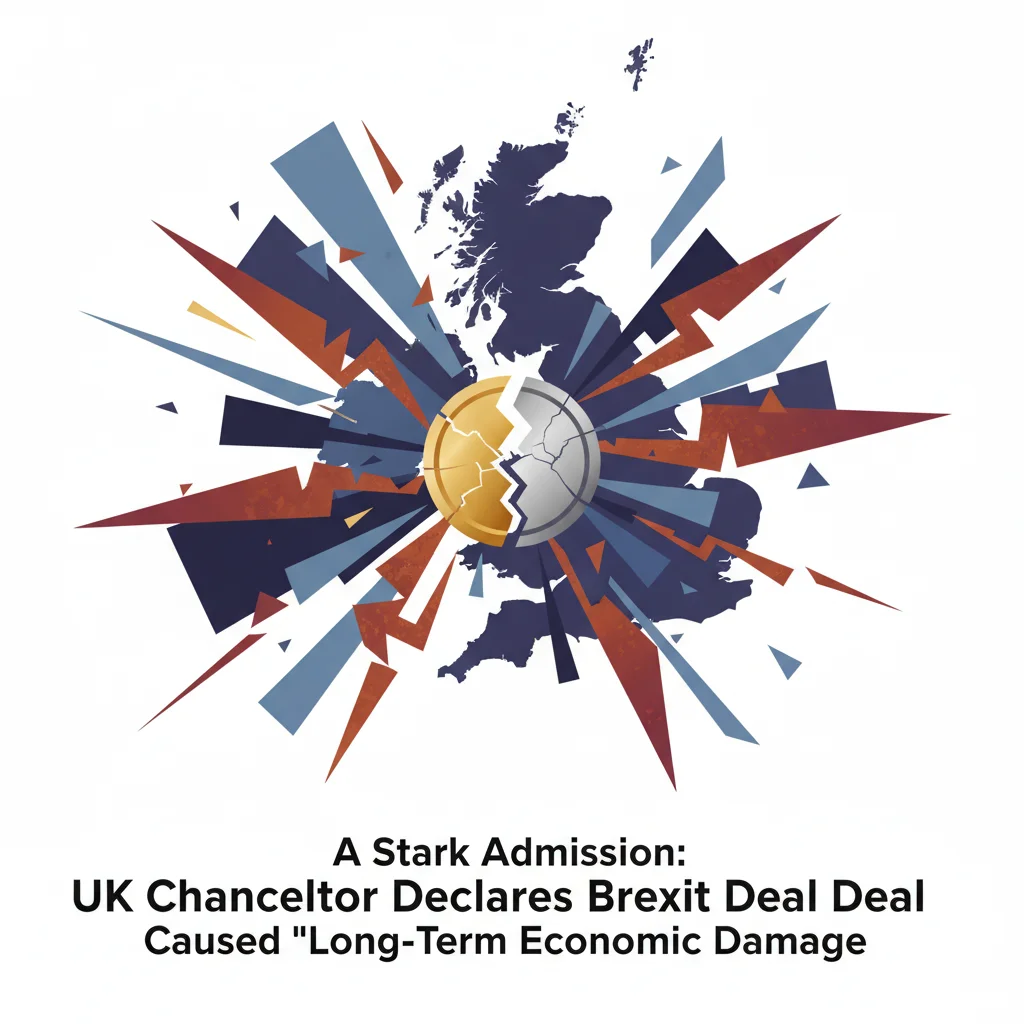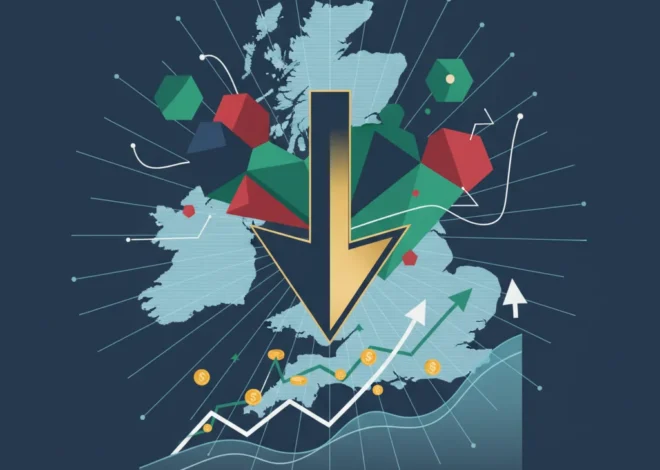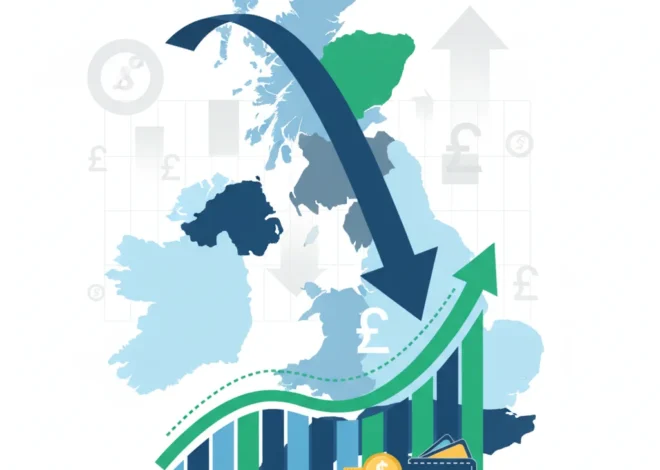
A Stark Admission: UK Chancellor Declares Brexit Deal Caused “Long-Term Economic Damage”
In the world of international finance, words are weighed in gold. So when a nation’s Chancellor of the Exchequer—in this case, the UK’s Rachel Reeves—stands before a global audience of finance ministers and central bankers and admits the country’s landmark trade deal has caused “long-term damage” to its own economy, the world listens. This wasn’t a slip of the tongue; it was a calculated, powerful statement signaling a potential seismic shift in the UK’s economic policy and its relationship with its largest trading partner.
Speaking at a key meeting, Reeves’ comments cut through the political noise that has surrounded Brexit for nearly a decade. She laid bare a reality that many in the finance and business communities have been quietly acknowledging for years: the 2020 Trade and Cooperation Agreement (TCA) with the European Union, while avoiding the chaos of a “no-deal” scenario, has created significant and persistent friction, hobbling the UK’s economic potential. But what is the real-world evidence behind this claim, and what does this stark admission mean for the future of the UK economy, for investors, and for the global stock market?
This deep dive will unpack the economic data, explore the sector-specific impacts, and analyze the profound implications of this pivotal moment in British economics.
The Data Behind the Damage: Quantifying the Brexit Effect
For years, disentangling the economic impact of Brexit from the global pandemic and the energy crisis following Russia’s invasion of Ukraine has been a complex task for economists. However, a consistent picture is emerging from the data, one that supports the Chancellor’s sobering assessment.
The UK’s own fiscal watchdog, the Office for Budget Responsibility (OBR), has been unequivocal in its analysis. It projects that the post-Brexit trading relationship will have a significant long-term impact. According to its economic outlook, leaving the EU will reduce the UK’s long-run productivity by 4% and reduce total UK imports and exports by 15% compared to a scenario where the UK had remained in the EU. This isn’t a temporary dip; it’s a structural change to the economy’s growth potential. In a March 2023 report, the OBR stated, “The first two years of data have been consistent with that initial judgement.” (source)
The core of the problem lies in “trade friction.” While the TCA eliminated tariffs on most goods, it introduced a mountain of non-tariff barriers: customs declarations, rules of origin checks, regulatory hurdles, and sanitary/phytosanitary (SPS) controls for agricultural products. These act as a tax on trade, adding costs and delays that disproportionately affect smaller businesses and complex supply chains. Research from the London School of Economics’ Centre for Economic Performance found that by the end of 2021, UK food exports to the EU were down by around 25% due to these new barriers (source).
To visualize the challenge, consider the comparative performance of the UK economy against its peers in the G7. While all nations have faced recent headwinds, the UK’s recovery and growth trajectory have often lagged.
Below is a simplified table illustrating the key areas of economic impact often cited in analyses of the UK’s post-Brexit performance.
| Economic Indicator | Observed Post-Brexit Trend & Analysis |
|---|---|
| Trade Intensity (Imports + Exports as % of GDP) | The UK has experienced a more pronounced and lasting fall in trade openness than any other G7 country since 2019. This suggests the new trade barriers with the EU are a primary factor. |
| Business Investment | Business investment has stagnated since the 2016 referendum, failing to keep pace with international counterparts. Uncertainty over the future trade relationship has been a major deterrent for long-term capital commitments. |
| Productivity Growth | Lower trade and investment directly impact productivity. Reduced access to the vast EU market limits competition and economies of scale, leading to slower efficiency gains across the economy. |
| GDP Growth Forecasts | Most major economic bodies, including the IMF and OECD, consistently forecast lower long-term growth for the UK compared to many other advanced economies, often citing Brexit as a contributing structural headwind. |
These macroeconomic indicators paint a clear picture. The “long-term damage” isn’t a hypothetical risk; it’s an observable trend in the UK’s economic data, impacting everything from international trading to domestic investment.
The Dragon's Embrace: Decoding the High-Stakes Economic Gamble Between India and China
Sector-by-Sector: The Ripple Effects on Finance, Fintech, and Beyond
The broad economic trends have manifested in distinct ways across different sectors, creating both challenges and, in some niche areas, unexpected opportunities.
The City of London: A Test of Resilience in Finance and Banking
Perhaps no sector was more central to the Brexit debate than the UK’s world-leading financial services industry. The loss of “passporting” rights—which allowed UK-based firms to sell their services seamlessly across the EU—was a significant blow. It forced major banks and financial institutions to relocate thousands of jobs and billions in assets to new European hubs like Paris, Frankfurt, and Dublin to continue serving EU clients. This has fundamentally altered the operational landscape of European banking.
However, the City of London has proven resilient. It remains a dominant global hub for finance, particularly in areas like foreign exchange trading and international insurance. The UK is now charting its own regulatory course, aiming to become a more agile and competitive center for global capital, free from the constraints of EU-wide rulemaking. This new freedom is a double-edged sword, offering flexibility but also creating regulatory divergence that can add complexity for international firms.
Financial Technology (Fintech): A Silver Lining?
While traditional banking faced headwinds, the UK’s burgeoning financial technology, or fintech, sector has continued to thrive. The government has actively sought to position the UK as a global leader in areas like open banking, digital assets, and even the regulation of blockchain technologies. By creating a regulatory “sandbox” and championing innovation, the UK aims to attract the next generation of financial disruptors. This strategy leverages the UK’s deep pools of talent and capital, suggesting that while some parts of the old financial order have moved, new opportunities in the digital economy are being aggressively pursued.
Manufacturing and Supply Chains: The Friction in Action
For industries reliant on just-in-time supply chains, the new trade barriers have been a persistent headache. Automotive manufacturers, for example, face complex “rules of origin” requirements to qualify for tariff-free trade, adding a significant administrative burden. The new reality of customs checks and potential delays has forced many businesses to hold more inventory, tying up capital and reducing efficiency. This has fundamentally challenged the economics of integrated cross-Channel manufacturing.
Beyond the Bourse: Why Marseille's Luxury Real Estate is the Ultimate Alternative Investment
Rachel Reeves’ statement is a masterclass in political and economic signaling. On one level, it’s a clear-eyed assessment of the facts, aligning the Labour party with the consensus view of most economists and business groups. But on another, it’s a strategic move to reset the national conversation ahead of a general election. By explicitly acknowledging the damage, she is giving her party permission to propose solutions that go beyond the current government’s “making Brexit work” mantra, without ever having to mention the politically toxic idea of “reversing” it.
For investors and business leaders, this is the key takeaway: the direction of travel for UK economic policy is likely to be towards pragmatic mitigation. Forget radical change; think incremental alignment. A future government under Reeves would almost certainly seek a new veterinary agreement to ease food trade friction and pursue deals on professional qualification recognition. This isn’t about rejoining the Single Market; it’s about sanding down the roughest edges of the current deal. This signals a potential shift from a period of ideological divergence to one of practical damage control. For the stock market and long-term investing, this could translate into reduced political risk and a more stable, albeit likely lower-growth, economic environment.
Navigating the Future: Policy, Investing, and the Path Forward
The admission of economic harm is not an endpoint; it’s the starting point for a new chapter in the UK’s post-Brexit journey. The focus now shifts from debating the existence of a problem to finding solutions to manage it.
The policy debate will likely center on how to deepen the UK-EU relationship within the confines of the existing TCA. This could involve sectoral agreements, regulatory alignment in specific areas like chemicals or medicine, and enhanced security cooperation. The goal will be to reduce trade friction wherever politically feasible, thereby boosting the UK’s flagging trade and investment figures.
For those involved in investing and trading, this evolving landscape requires careful monitoring. Key considerations include:
- Currency Fluctuations (GBP): The pound sterling remains highly sensitive to news about the UK-EU relationship. Any move towards a closer partnership could strengthen the currency, while renewed tensions could weaken it.
- Sector Performance: Industries most affected by trade barriers (e.g., agriculture, manufacturing) could see a significant upside from any new agreements that ease friction. Conversely, domestically-focused companies may be less impacted.
- The UK Stock Market: The FTSE indices are home to many large, multinational corporations whose earnings are generated globally, making them somewhat insulated from domestic economic woes. However, a healthier domestic economy would undoubtedly improve sentiment and boost the performance of mid-cap and smaller UK-focused companies.
The £11 Billion Typo: Why the Car Finance Scandal is the UK's Next Financial Reckoning
Conclusion: A New Realism for the UK Economy
Chancellor Rachel Reeves’ declaration that the Brexit deal has caused long-term damage is more than a headline. It represents a critical turning point—a shift from political aspiration to economic realism. The data from the OBR and other institutions has consistently pointed to the costs of new trade barriers, which have weighed on trade, investment, and overall productivity.
For investors, finance professionals, and business leaders, this new era of pragmatism demands attention. The future of the UK economy will not be defined by a reversal of Brexit, but by the skill and determination with which its leaders address the challenges it has created. As the political rhetoric cools and the economic realities set in, the focus must now be on building a new, sustainable model for growth—one that acknowledges the damage done and strategically navigates the complex path forward.


